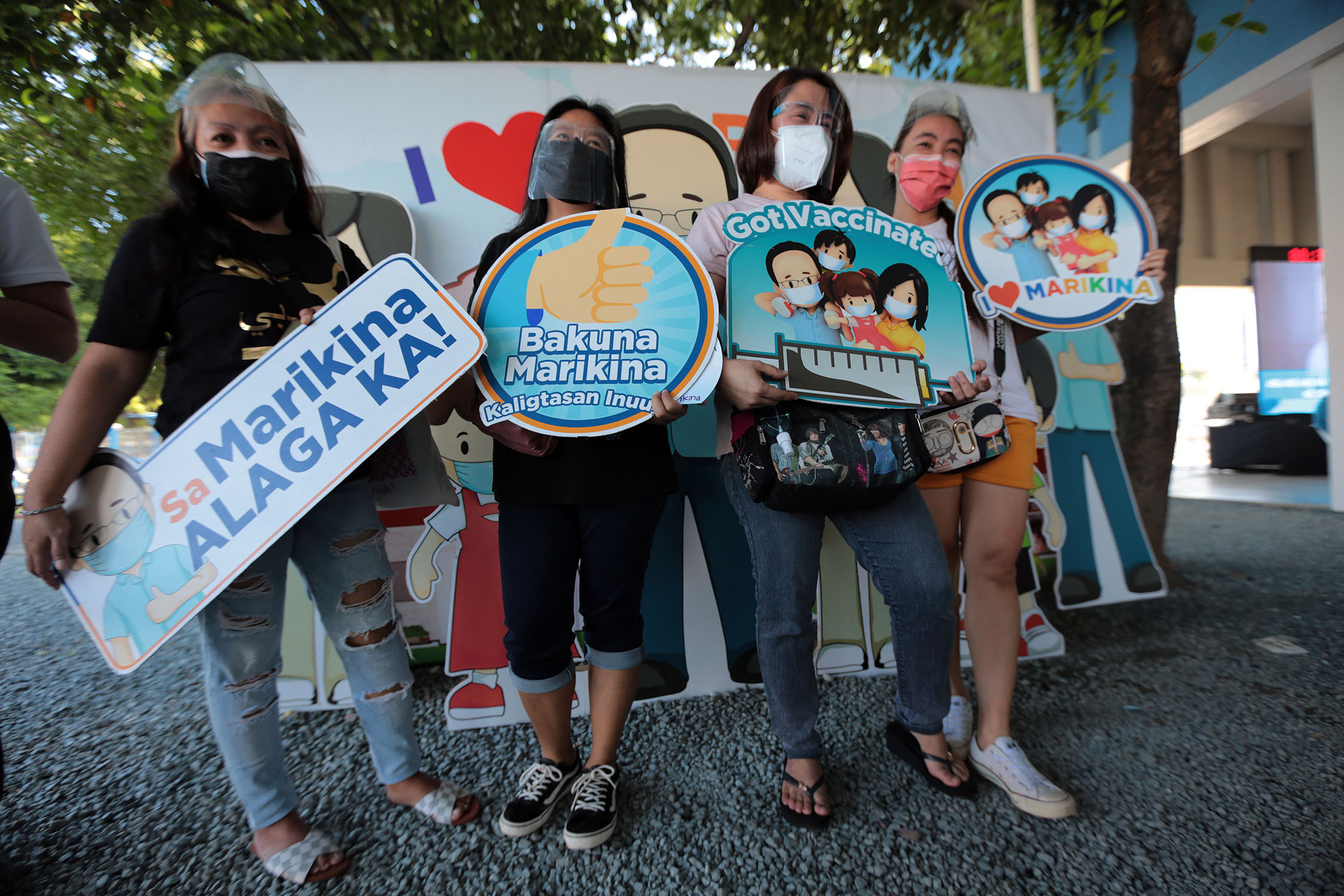
SOUVENIR SHOT AFTER THE ‘SHOT’ Behind those face masks must be a smile. Newly vaccinated residents record the moment at the Marikina Sports Center on Friday. —GRIG C. MONTEGRANDE
The Commission on Audit (COA) will scrutinize the COVID-19 vaccines purchased by or donated to the government despite the insistence of manufacturers or suppliers on the nondisclosure of prices.
COA Chair Michael Aguinaldo said on Friday that the body’s constitutional mandate to audit public funds was “exempt” from these nondisclosure agreements (NDA). He told the House of Representatives’ committee on appropriations that guidelines were issued two months ago on “the audit of the national vaccination program.”
“We can confirm that we will audit all expenditures relating to the vaccines,” Aguinaldo told the committee that is deliberating on the COA’s proposed budget for 2022.
Public funds
He said the COA would be sufficiently guided in the audit of “the purchases of vaccines, and even the use of vaccines that have been donated.”
The COA is undaunted by the nondisclosure stipulated by certain suppliers, which prevents the government from discussing the costs of the vaccines bought with public funds.
“My understanding is, the nondisclosure provisions were a requirement of the manufacturers or those providing the vaccines. Of course, when that undergoes audit, I think [the audit] would be considered an exemption from the nondisclosure,” said Aguinaldo, a lawyer.
“Actually, we’ve started on it, although it’s mainly an activity for 2022. … Those matters have to be disclosed,” he said.
Pressed further by Albay Rep. Edcel Lagman, Aguinaldo went on: “I would tend to look at the duty of the commission as an exemption to an NDA. An NDA is really governed by whatever the stipulations state. But I think it’s a given exemption that there are government processes that have to be followed.”
Transparency
Lagman has been pushing for an audit of public funds used in buying COVID-19 vaccines. He has criticized the nondisclosure clause as a violation of laws requiring transparency and accountability in government expenditures.
On Friday, Lagman cited Republic Act No. 11525, or the COVID-19 Vaccination Program Act, which requires transparency and accountability in vaccine procurement, as well as the disclosure of suppliers’ names and the contract prices of the vaccines.
He also cited Republic Act No. 9184, or the Government Procurement Reform Act, which imposes stricter provisions on transparency, with a requirement that procurement contracts should be posted publicly or online.
“The NDA also infringes on the Constitution, which mandates the COA to audit government expenditures. The Department of Health and National Task Force Against COVID-19 must reveal at least to the COA the actual prices of the vaccines they have procured in order for the state auditors to determine how much of the budget has been utilized, and whether the procurement is aboveboard. The NDA cannot be ascendant over the Constitution and Philippine domestic laws,” Lagman said.
7 months old
Now on its seventh month, the COVID-19 inoculation program has been marred by low vaccine supply and spotty deployment in the provinces.
As of Aug. 29, a total of 33,099,392 doses have been administered, of which 19,314,711 were for the first dose and 13,784,681 for the second dose.
The government aims to vaccinate at least 70 percent of the Philippines’ 110 million population against COVID-19.
The COA has lately angered President Duterte for its reports on the deficiencies of government agencies in the management of pandemic funds.
Proposed budget
On Friday, the COA presented its P14.463-billion proposed budget in 2022, broken down into: P13.248 billion for personnel services; P571.367 million for maintenance and other operating expenses (MOOE); and P643.71 million for capital outlay.
The allocation for personnel service is higher than this year’s P12.907 billion due to salary increases under Republic Act No. 11466, or the 2019 Salary Standardization Law, Aguinaldo said.
Even with the higher funding for personnel services, the COA still has to fill 5,826 vacancies in order to reach its 14,102 authorized staff positions.
Senate President Pro Tempore Ralph Recto has urged the COA to go on a hiring binge, saying that state auditors among the 8,276 filled positions were “spread too thinly.”
Baguio City Rep. Mark Go, chair of the House committee on higher and technical education, made a similar call to the audit body during Friday’s hearing.
Aguinaldo replied that the COA was trying its best to fill up the vacancies but that more employees were retiring each year.
The agency’s 2022 capital outlay also rose from this year’s P586.916 million to include P500 million for the completion of its office building.
For its MOOE allocation, the COA initially proposed P642.167 million but the Department of Budget and Management approved only P571.367 million, Aguinaldo said.
He said the agency’s proposals for increased budget for local travel and operational costs for 54 provincial satellite audit offices nationwide were not considered.